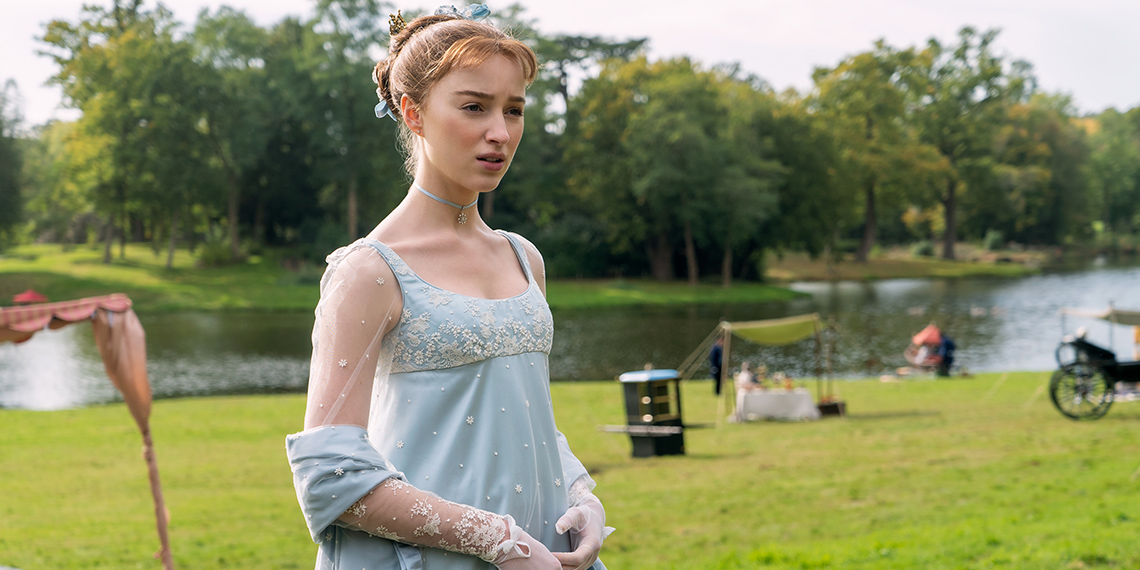I’m an avid Jane Austen adaptation fan. I love Keira Knightley in Pride and Prejudice and also enjoy the book, plus Pride and Prejudice and Zombies and its offshoots. I swoon for the Emma Thompson version of Sense and Sensibility. Before the end of the world, the last play I saw in a real, live theatre was Christmas at Pemberley, basically a fan fic play about life post-Pride and Prejudice. So you can bet I binge watched Bridgerton, the “inclusive Regency” based on the best-selling novels by Julia Quinn and executive produced by Shonda Rhimes. Now that the show has been renewed for a second season, I’m considering why I—along with every woman I know—am so enamored with the show and why women are drawn to Regency dramas.
I assume you’ve watched the first season, but, if not, SPOILERS AHEAD.
The magic of the show is not only its gorgeous cast and production values, its twist on the “traditional” (read: white and straight) love story, and its 90s teen movie plot, it’s also that the story doesn’t end at happily ever married. In order to appease we who may be a little sex-starved this quarantine, Bridgerton treats us to Daphne and Simon’s honeymoon and beyond. Cue love scenes.
But, as someone who recently left a toxic relationship, what I thought would be a whole new universe of Regency love turned out to be more triggering and heartbreaking than anything. Because of my strong emotional reaction to the show’s depiction of marriage in the Regency Era, I began to analyze and research why it is that we love the toxic couples populating the books, movies, and now television programs we consume so fervently.
Time to break out my English major. Finally.
The anxiety of sexual tension and ignorance is why we love Regency dramas. Like Ross and Rachel, with the “will-they-won’t-they”, followed by the “they did”, followed by the breakup, followed by the resolution, followed by the baby and the happy family unit plot, Regency dramas are all about the pleasure in antici (wait for it) pation.
Hotness aside, objectively, Daphne and Simon are a terrible couple! Their affection for each other was based on a lie. Their betrothal was forced. Simon lies to Daphne about “not being able to have children,” banking on her naivete about sex. Then, Daphne straight-up rapes Simon to prove his “seed is strong.” I can’t believe it, but we are all still rooting for the couple and are happy to see them happily ever after with a baby in the final scene. WHAT IS WRONG WITH US?! (*rewatches entire season*)
It’s not only the tension of the timeline. Lovers of the Regency drama are attracted to Mr. Darcy, the dark, brooding, mysterious but sexy love interest of Pride and Prejudice (and Bridget Jones). The too-fancy, snooty, mean man really gets us bookish girls going. We want someone who is independently wealthy and aloof. We want someone withholding so that when he finally, finally tells us that he burns for us, we have a bigger, ahem, release of tension. Mr. Big from Sex in the City would be another cultural example of a Mr. Darcy type, and we all know in our heart of hearts Carrie should have married Aidan and never would have.
The men in Regency dramas know more about the world than the women, something Bridgerton uses as a plot device. Did anyone else squirm with the impropriety of Simon telling Daphne she should masturbate? The Duke of Hastings is amused by and attracted to Daphne’s virginity. As we watch these shows and read these books, we’re given the message that, if we’re good girls, we will be rewarded with a rich, loving spouse—but the Duke’s behavior in Bridgerton is not loving. Sexy af, but also… he’s gaslighting Daphne. He makes her believe he cannot have children when he actually doesn’t want children and is assured she won’t challenge him because she does not know the mechanics of the male orgasm. Guys, it’s okay not to want children, but you have to lead with that. Daphne broke my heart and called Simon out after the rape scene and the confrontation afterward when she says, “I do not know many things, as you have made abundantly clear, but I do know this: That is not love.”
Here’s the thing: I think these two crazy kids do love each other. In the end, we are happy for them because they learn to communicate after a wet and wild resolution in the rain. Mr. Darcy eventually stops moping around, shows himself to be a hero to the Bennett family, and is bewitched by Elizabeth’s body and soul (misquote for emphasis). We want to be loved as completely as these heroines of Regency dramas. We’re willing to suffer for that love.
Too many women, sadly myself included, fall for the guy with secrets. We like a man who isn’t too into us at first. We like the chase. Much has been said about men wanting the chase as well. The problem we run into on both sides is that we like the chase too much and cannot be content with the happily ever after. Like the Duke and Duchess of Hastings, we bring the drama into the consummated relationship. We bring the lies. We withhold. And then we fall apart.
The sex appeal of the Regency drama lies not in the happy resolution, but in the pain and anxiety of unresolved sexual tension, something lovers have been using against their romantic partners for all of time. As much as I’d love to say that relationships are moving more toward open communication, mutual respect, and, dare I say it, unconditional love, Bridgerton and the like show that, when it comes to matters of the heart, we all love the anticipation.
I can’t wait for season two.
Images: LIAM DANIEL/NETFLIX


















































